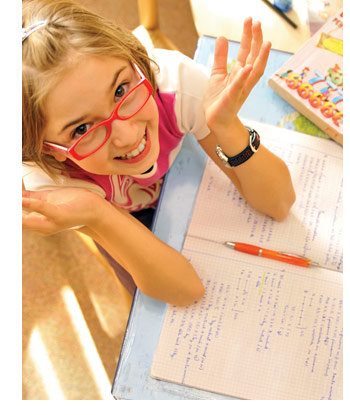Building Healthy Homework Habits!
Getting children to complete their homework is not impossible; All you need is Healthy Homework Habits!.
 1. Healthy habits take time to learn.
1. Healthy habits take time to learn.
Creating habits of success in your children will take a while, perhaps a month or two. During this learning period, it’s important to stick to the principles and follow the guidelines outlined here. Be patient. Don’t expect immediate results - or you will abandon a successful strategy just because you failed to give the seeds of success an opportunity to grow.
2. Allow your children to have opportunities to fail.
If you try to protect your children from every failure, you guarantee their ultimate failure, because they won’t be prepared for life. Allow them to experience the consequences of their choices.
This doesn’t mean you just ignore their actions, or pretend you don’t care. You must learn, however, that protecting kids from the consequences of their choices is the equivalent of expecting a muscle to grow when you never work it. It just doesn’t happen. Life happens. In every circumstance, there is a consequence for choices. Please recognise the critical role that life consequences play in teaching your kids about life.
We can’t protect them from age-appropriate struggles and choices; this is how they build emotional, social and intellectual “muscle.” Protect them from the consequences that come with poor habits, and you will teach them a false lesson. They will grow up thinking that the world will protect them from poor choices - and this just isn’t so!
3. Words don’t teach critical lessons. Consequences do.
I’ve never seen a child turn around his or her academic performance after receiving a lecture from a parent or teacher. Instead, children feel bad about not measuring up, offer excuses and lies, and-most important - start to believe that they’re poor students. After a while, kids learn to ignore repeated discussions and lectures; you just become like background noise. Instead of lecturing, parents can make certain that the environment is structured in a way that consequences will teach the lessons they want their children to learn. During the teaching-learning process, children will fail. They won’t always perform the way you want them to. Just stay the course and keep the consequences in place.
4. Establish the structure of success: “Work, then play. Everyday.”
Successful students and successful adults organise their lives so that they work first and then play, a structure that automatically rewards effort. Parents can apply this principle as a ground rule until the kids graduate from secondary school: Every day after school, the children do their homework, then they may play. Until their work is finished, there are no phone calls, visitors, toys, TV - no distractions. If they don’t want to do their work, don’t argue with them. In most cases, they’ll quickly become so bored that they’ll choose to get the work done. Over time, this structure will produce a powerful set of behaviors that will propel your children to success in any endeavour.
The key is to be consistent. For example, if the football game is at 4:30 and your children get home from school at 3:00, they must complete their homework before the game - or they won’t go.
5. Do not nag, argue, or lecture about homework.
No need. Your kids are smart. Set up the ground rule: “Work, then play.” Enforce the no-play with action - not words. Avoid the word battles and threats. You may be able to use these tactics and win the battle for that particular evening; however, you’ll lose the war. As your children get older, the battles will increase, and this relationship is the basis for your influence and leverage in your teenagers’ lives. What should you do instead? Make clear that “work then play” is the rule every day. Don’t offer repeated lectures or discussions about this; just remain absolutely firm and unwavering in your denial of play activities until work is complete. You can expect frustration and anger, whining and complaining from your child. Accept it and ignore it. Stick to the rule.
6. Focus on efforts, not outcomes.
Reward your children with attention while they’re working. It can be as simple as a touch on the shoulder or a smile. Don’t interrupt their work, but casually engage them while they’re putting in effort. As they learn to work more diligently, continue to pay them attention, but less often When they finish, remark on their effort rather than the quality of their work.
7. To promote independent learning and thinking, teach independence.
Don’t sit with your children and guide them through their homework. Don’t answer every question and help them with every little challenge. If you do this, you’re promoting an attitude of helplessness and incompetence, It’s essential that they learn to tackle these difficulties themselves. Think of yourself as a coach:
• Give instruction and allow opportunities to learn.
• Ignore whining and complaining.
• Have them save their questions for the end of the homework session, so they’re encouraged to answer them on their own.
• If they genuinely need help, offer guidance and direction but let them solve the problems.
8. Teach your child to self-correct
Many parents are reluctant to send their children to school with homework that’s less than 100 percent accurate. They want their children to get A´s. This isn’t doing them any favours.
Instead, we need to send them to school with work that reflects their skill level, so the teacher will know what to respond to and focus on. Instead of correcting homework, coach your children to do it themselves. Ask questions that guide their attention to errors and help them solve problems, then notice and reward their efforts. If you assume the responsibility for correcting their homework, you’ll produce children who depend on you for all the answers. As they get older, this will produce more frustration in school and poorer performance. How do you do this within the “Work, then play” approach? Simple, You make sure the homework is “checked” by you before play begins. In other words, HOLD THEM ACCOUNTABLE! Give few clues, when you see errors. Over time, gradually put more and more responsibility on them to find their errors before they can play. In this way, there is no reward in rushing through their work. There is reward in learning to pay better attention, so that you don’t have to keep repeating your homework. Slowly for some, they get it. Others will get it very quickly.
9. Hold the Course.
As you implement these strategies, do so strongly and confidently, so your children know you’re prepared to hold the course. They’ll recognise any hesitancy. Be firm and consistent in your control of the environment, not in your control of your children. Offer them a choice, but maintain the “work then play” structure every day. Then sit back and have some fun. Notice how enjoyable your interactions with your children become when you’re no longer nagging them to do their homework. Instead, you’re allowing the consequences of the work-then-play approach to build behaviour over time. Be patient. Healthy behaviour doesn’t appear overnight, or in a week. If you persist, you’ll likely to see changes in two to six weeks.




